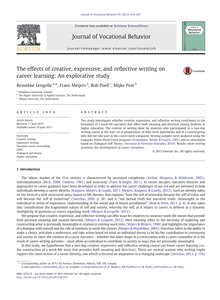The sharing economy holds promise for the way we consume, work, and interact. However, consuming in the sharing economy is not without risk, as institutional trust measures (e.g. contracts, regulations, guarantees) are often absent. Trust between sellers and buyers is therefore crucial to complete transactions successfully. From a buyer ́s perspective, a seller ́s profile is an important source of information for judging trustworthiness, because it contains multiple trust cues such as a reputation score, a profile picture, and a textual self-description. The effect of a seller’s self-description on perceived trustworthiness is still poorly understood. We examine how the linguistic features of a seller’s self-description predict perceived trustworthiness. To determine the perceived trustworthiness of 259 profiles, 189 real buyers on a Dutch sharing platform rated their trustworthiness. The results show that profiles were perceived as more trustworthy if they contained more words (which could be an indicator of uncertainty reduction), more words related to cooking (indicator of expertise), and more words related to positive emotions (indicator of enthusiasm). Also, a profile’s perceived trustworthiness score correlated positively with the seller’s actual sales performance. These findings indicate that a seller’s self-description is a relevant signal to buyers, eventhough it is cheap talk (i.e. easy to produce). The results can guide sellers on how to self-present themselves on sharing platforms and inform platform owners on how to design their platform so that it enhances trust between platform users.
DOCUMENT
This study investigates whether creative, expressive, and reflective writing contributes to the formation of a work-life narrative that offers both meaning and direction among students in higher education. The content of writing done by students who participated in a two-day writing course at the start (or in preparation) of their work placements and of a control group who did not take part in the course were compared. Writing samples were analysed using the Linguistic Index Word Count program (Pennebaker, Booth, & Francis, 2007) and an instrument based on Dialogical Self Theory (Hermans & Hermans-Konopka, 2010). Results show writing promotes the development of career narratives.
DOCUMENT

This study investigates whether creative, expressive, and reflective writing contributes to the formation of a narrative career identity that offers students in higher education a sense of meaning and direction. The contents of writing done by students who participated in 2 two-day writing courses before and after work placements and of a control group were compared. Employers were also asked to evaluate students' performance. Writing samples were analyzed using the Linguistic Index Word Count program and an instrument based on Dialogical Self Theory. Work-placement self-reports were gathered, examined, and used as anecdotal evidence presented in the form of case studies. The results show that career writing can promote the development of career identity and holds promise as a narrative career guidance approach.
DOCUMENT
